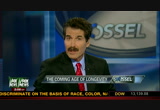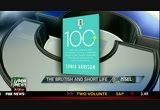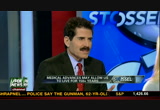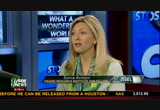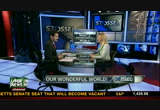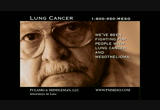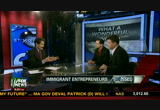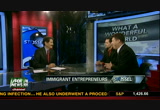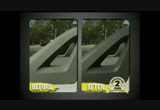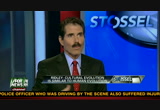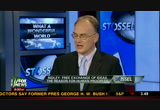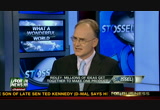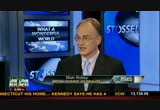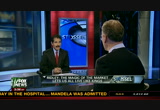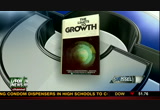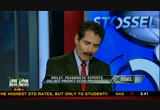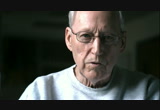tv Stossel FOX News December 24, 2012 12:00pm-1:00pm PST
12:00 pm
>>heather: you can track the entire journey from norad who has been tracking st. knick since 1955. >>gregg: was that the real santa? he is not wear the big boots? what happened to the big black belt? did he put on weight? was that a nightgown? >>heather: how could that not will be real santa with the beard? >>gregg: what is the difference between santa and father christmas? >>heather: there is a difference? >>gregg: thanks for watching, everyone, i am greg jarret. >>heather: stossel starts right now. >> biological attack is possible. >> swine flu panic grips the nation. >> climate change is killing people. >> the media says life is horrible. >> poverty has reached new
12:01 pm
depths. >> but the media missed the big picture. >> i was only four when i saw my motherlode a washing machine for the first time. >> this is a wonderful word and getting better. his grandmother was thrilled by a washing machine. >> she sat down and watched the entire washing program. >> two, one, fire! >> the machines coming next or better thanks to competition. and they build school cars and space ships. >> entrepreneurs do what only governments did before. >> maybe cities will be built on water flow from big government. >> this is outside the united states jurisdiction. >> life gets better because ideas have sex. >> wait, ideas have sex? >> yes. >> ideas spread. when they meet they can mate.
12:02 pm
>> because of that we live in a wonderful world. that is our show tonight. >> now, john stossel. ♪ i think to myself ♪ what wonderful world >> what a wonderful world? what are they talking about? all we hear from the media is doom, unemployment, pollution, social conflict, all the things exist but couldn't once in a while someone put it in perspective? this man did that. i usually don't like to put on swedish public health professionals or danish public health professionals they put the world's attentiongentleman
12:03 pm
because he gave a tech talk, technology entertainment design, many are boring but his talk has been viewed 100,000 times. here is part of it. >> i was only four years old when i saw my motherlode the washing machine for the very first time in her life. even grandma was invited to see the machine. throughout her life, she had been heating water with fire hood and hand wash laundry for her seven children and sat down in front of the machine and she watched the entire washing program. to my grandmother, the washing machine was a miracle. >> but there are seven billion people on work and most have no access to such miracles. >> two billion have access and the remaining five billion, how
12:04 pm
do they wash? they wash like this: by hand. it is a time consuming labor which they have to do for hours every week. they want the washing machine. they don't want to spend such a large part of their life doing this hard work with so relatively low productivity. but when i electric truer to environmentally concerned students they say everyone in the can world cannot have cars and washing machine. how can we tell this woman she will not have a washing machine? >> you students don't want everyone to have a washing machine? >> they have not thought it through. they get concerned about one thing and forget reality. i say how many of you have not washed your jeans or sheets. one boy said he hand washed but there was an e circle around where he was sitting. it is sort of a "we like it
12:05 pm
because it saves so much time." that is part of the industrial revolution that everyone wants. when they say lonely the power station, and long live the chemical processing industry... >> he corrected me, and this video was not viewed by several hundred thousand but by how many? >> totally, ten million. >> and you do a presentation, that most of history people were miserably poor and died before age 40 and only recently things have changes. did you a chart this is life span. this is wealth. for most of history, people have been down here, only recently, the united states and some other countries are here, but many people are still, we have it here, stuck.
12:06 pm
>>guest: this is 180, -- 1800 everyone was sick and poor and they started to move. this is a representation of what you should look at on the web page and some -- this is britain. this is when britain was richer but the united states decided to catch up. and now this is australia and new zealand. now at turn of the century, united states is pushing forward with technology and the market economy and they have a lot of good public health things being done and the rest of the world that is dominateing, india and china, but in the 60's they missed. the market economies are good and they grow their economies and they are catching up. today when we land, 2010, these
12:07 pm
are the countries that borrow money to the richest when they have their problems. >> in my mind this raises two questions, or two amazing results from this. there have been thousands of years of human history and everyone was stuck on the lower left for thousands of years, it has been 200 years that you have all of this activity and how come some countries are still stuck? >> it is easy to understand. the best message today is that most of the african countries are now in fast economic growth. they have corrected the wrong market ideas they had 20 years ago, and they have a much better education than, -- and tanzania is similar to thailand in 1972 and soon we will see african
12:08 pm
countries doing good. >> this is wonderful. our problems are solved w know what works and we will be rich. >>guest: no, we have this problem with two billion human beings in poverty. i did most of my research in the poor part of the world. all poor people are clever otherwise they would be died. if you are poor and stupid, you die. >> they don't have rule of law? >>guest: they don't have rule of law or access to credit and they are locked in a vicious circle poverty. it takes a small investment to get them out of that. to me it shows the aptitude of people. when a young couple decide to grab if the kingdom and to have two children, they invest in the children and they take off. we have two-child families from here and onward. the world is governed from that.
12:09 pm
it is not the big corporations or banks that run the economy, it is the young couple who decide to work. >> when they are educated with wealth they . >> are helpful. this fantastic investment in vaccinations that helps so do you not have a kid who is physically handicapped for life, that drags the family down. the way that government sources are used is crucial. there are some things like advancement and research and primary school we need the government money but it has to be controlled. >> thank you, sir. next, you want to live to be 150? my next guest says the first person to do so my have already been born. it might be you. do you want to live to be 150? i don't. how advances in medicine may change everything. .so as you cas customer satisfaction is at 97%.
12:10 pm
mmmm tasty. and cut! very good. people are always asking me how we make these geico adverts. so we're taking you behind the scenes. this coffee cup, for example, is computer animated. it's not real. geico's customer satisfaction is quite real though. this computer-animated coffee tastes dreadful. geico. 15 minutes could save you 15 % or more on car insurance. someone get me a latte will ya, please? starts with arthritis pain and a choice. take tylenol or take aleve, the #1 recommended pain reliever by orthopedic doctors. just two aleve can keep pain away all day. back to the news.
12:11 pm
12:12 pm
12:13 pm
>> most of human history people died by age 30. 30 year was the average life span for thousands of years. only with the industrial revolution did that change and it changed quickly by 1850 the average life span was almost 40. 50 years later, 47. by 1950, it was up to 68. now, the average in america is 78. 76 for men and 81 for women. the numbers will only go up. and up. the. >> their of a book called "100 plus, the coming age of longevity will change everything." everything? >>guest: everything. >> how much longevity? >>guest: i take the premise it will be possible in for average
12:14 pm
life expectancy to go up to 150. >> there is someone alive today who will live to be 150? >>guest: absolutely. >> is that creepy? you will be shriveled? >>guest: no, we will be healthier for longer, and energetic and enjoying likes. >> because they invent body part replacements. >>guest: that is a low-hanging fruits. scientists have created brand new humoring begans using a person's adult stem cells so bladders, trachea, human blood vessels, they have been created already. >> so, assume we accept this, we are healthy, what happens to your life? you work longer? you change jobs? don't you get sick of it? >>guest: the exiting is, there will be much more opportunity. right now, with the average life span of 80 years, if you want to
12:15 pm
be a doctor, a lawyer, and an entrepreneur it and tough to have all of those three years because two of the years require a lot education. when we have longer healthier lifespans we can go back to education and try new years we would not have tried otherwise. >> they will change families? >>guest: we will be around longer, there is more potential to have more marriages and of course fertility extends, there could be different types of family structures. it will be more diverse. >> you could have a sibling who is 50 years younger in. >> yes. >> some of this creeps me out a bit. "new york times" op-ed they write silly things and they said, people should not live longer, you will lose purpose in life. i met a guy who said i am 69, if i make it to 75, i'll done, i've had it. don't you lose the edge?
12:16 pm
is there a natural cycle? >>guest: i think people tend to say that because they assume as you get older you also get ill but when that is the case, you do lose your lust for life but if you are healthy and energetic, there is so much more to do and you think about it, you never have enough time to do everything you want, do you? we need more time. >> there was a profile of the person, the billionaire who wrote the forward to your book, and it was silly, and a silly things they said was that this extending life is not a good idea because the technology will be available to rich people first and it will add to inequality. >>guest: that is a knee-jerk reaction but we hear that when you talk about any type of new technology. think when cell phones first came out. only the rich people had cell phones. yes, they were the size of a brick and you carried around in a briefcase and it is a good
12:17 pm
thing they funded that technology because it led to cheaper devices that we now use. >> eventually, your point, is it will get to everyone. the guy who wrote the forward says the biggest inequality is define those who are alive and dead but the rich people experiment first, they will get hurt first by the mistakes. >>guest: that is right. they take the most risk and put the most capital forward. in some ways it is good that happens. the biggest question, how long does it take between the rich getting it and the poor getting it and that is shrinking for new technology. that divide. >> thank you, sonia, more on our wonderful world. despite what the media whines about, it is a wonderful world. more on that when we come back.
12:21 pm
12:22 pm
we would have lost a lot. so, since american politicians are not taking steps to change the rules to allow more entrepreneurs to come here to work, dario and max, my guests, have set out to build a ship and keep it off the coast of california outside the reach of immigration controls and foreign entrepreneurs could work here, is that the idea? >> that is correct. we are creating what we call a visa free technology incubator on a ship, 12 miles off the coast of the bay area. >> definitely miles escapes the rules of the united states. >>guest: it is outside the territorial waters. >> the idea is and you are from the silicon valley area, that you can come to america with a work visa and work three months or six months but you cannot stay so you have the four engineers on the boat and the
12:23 pm
silicon valley tech geniuses go back and for the and work with them? >>guest: when you come for a few months on tourist or work visas you cannot work, so there is no avenue where the entrepreneurs can come hour and create the companies which create the jobs and the economic growth and the prosperity and put silicon valley on the map. >> time is needed for the companies to grow and enable them to have that period of time to meet relevant investors and they can grow. it is an incute baiter to get the small companies to be able to blow. >> you call it the blue seed project? why not green egg? >> blue because it is on water and seed is a small company before it grows into the next google or facebook.
12:24 pm
>> it is the google plex of the sea. >>guest: we are familiar with google, the real google plex where intelligent and creative people can work in a fantastic set of circumstances. >> that is what google called office space station. >>guest: a nice environment, which is conducive to creation of new products and new companies, and we like to copy that model on our vessel. >> you came up with this idea after graduate school? >>guest: when i was in graduate school i got my mba from the university of miami and many people from all ports of the world, india, europe, china, who wanted to stay here after they graduated and work on their companies, create new start-ups, but they were unable to do so because after you graduate you get a job with an existing company or you leave and for many them that was not a good
12:25 pm
option and they left and took their ideas and companies with them. >> so they get their fancy education here and go back to indian or somewhere else. >>guest: we would like to stem the tide and keep them closer, and bring them back to the united states so they can create new jobs. and new companies. >> if they worked for a company they could have stayed? >>guest: if you get sponsored by a large corporation you can get the prop visas to work in the country but you cannot self sponsor and you cannot be here and create your own start-ups without going through some pretty significant legal work. >> to build this big ship where people live cost as lot of money and people are actually giving you money for this? >>guest: the face book funder and creator of pay pay pal is helping us and bringing in a number of investors. he will give us a significant
12:26 pm
fraction of what we still need to raise our seed funding. >> we called one of the large immigration reform groups, they call themselves, they limited on immigration, and they said they could have paid a higher wage and found americans to do this engineering work. this is nautical grandstanding. >>guest: i would like to address that. basically, it is a way for companies to come so instead of leaving the united states they will be coming into the united states and it is the opposite of what that gentleman mentioned. >> and you are both immigrants yourself. >>guest: yes. my parents are from cuba. they came over when castro took power and now they entrepreneurs. >> you are from yugoslavia? >>guest: yes from the ex yugoslavia. >> there is something about people who want to leave their country and go do a new country that makes them more likely to not only kill us but to build
12:27 pm
something. >>guest: they have the entrepreneurial spirit. that is what boosted the can do attitude which is the american trade that has a lot to do with a fact that this is a nation built by immigrants, so, try to provide a solution to a problem, an entrepreneurial solution ourselves. >> you are doing that, so, thank you, car i don't and max, coming up, ideas have...sex. what? what? that sounds inappropriate the my quest says it is what makes our world so wonderful. he is right. he will explain when we come back.
12:31 pm
>> now, let's talk about ideas having sex. you have one idea. she goes to a bar and meets another idea. they get together and days or months later, i am not sure how it relates, but a baby results and the baby has the best traits of both parents. when this happens a lot, everyone gets smarter and the world gets better. i know this seems like a weird concept. it seemed weird to me when i first heard it but the more i thought about it the more right it seemed. now to a british journalist, the
12:32 pm
reason, you say, life gets better is ideas have sex, in effect. >>guest: ideas spread through exchange and trade and when they meet they can mate and you can produce combinations of different ideas. ploy favorite example is camera pill which takes a picture of your inside coming about after a conversation of a guided missile designer and a gastro interologist. the meeting of ideas causes innovation in culture. >> the genes do not have brains, they can meet and you get something bad. >>guest: that is true. it is true with us. you can combine two ideas and come up with a worse idea but no one picks it up, no one takes it off. if you come up with a better
12:33 pm
idea it spreads at the expense of the baddie and the recombining and what we do. the more we trade, the more we exchange, the more it happens. >> and the better life gets in general. >>guest: absolutely. our living standards have shot up in my lifetime. the average income of the average person is throw times what it was when i was born and life span is 30 percent longer and child mortality is two-thirds lower that is because we keep improving each other's living standards. >> so, you like to show people this picture. >>guest: the object on the left is a hand a and from half a million years ago and sits on my desk at home, the hand ax and next to it is the computer mouse, and they are the same size and shape and the ax was madeed without a change in design for half a million years. it is made from a single substance and the mouse is made
12:34 pm
from a bunch of different substances, plastic and metal and so on and it combines different ideas, that occurred to different people in different times and different places and they all come together in this technology and that is how we are better off with the combinations of ideas. >> the mouse improves is often that the one i have a few years ago is already out of date >>guest: the one i took a picture of with the hand ax is no longer used by me. >> this work thursday a free exchange of idea but it does now work if there is central planning. >>guest: exactly the one thing about the way ideas come together and recombine is it actually creates things that are greater than the sum of the parts and things we do not understand. no one knows how to make a computer mouse, i am quoting. >> someone knows, i have a computer miscellaneous. >>guest: no one person.
12:35 pm
no one person. the knowledge is shared among lots of different people. this is the inside of the economist when someone said no one knows how to make a pencil. it is a collective brain that achieves this. when you try and substitute an individual's intelligence by putting a man in charge of computer mouse manufacturing he cannot do as go a job as the collection with each of us knowing a little bit of the picture. >> the computer mouse could have parts from china and india and the united states and hundreds of different people and the person who ships it and puts it in the box. >>guest: it is --. >> a million people could contribute. >>guest: it probably is a million. they are all working for me when they made it because it is my mouse and you have to include the guy in brazil who is growing coffee drunk by the guy on the oil rig who was drilling for oil whose oil would be used in the plastic factory, et cetera, they
12:36 pm
were all woring for me and that is the beauty of the system we have created, we work for each other all the time. we are each other's servants. >> but no one is bossing people around it is voluntary. >>guest: that is right. no one forces you to go out and buy a computer mouse or forces the guy who made the mouse to work for me or me to work for him because i am working for him because i have the money from my work to buy the mouse. >> you argue that even if dumb people get together and have their ideas have sex that comes up with better results than the brilliant central planner. >>guest: thing this is why the obsession with i.q. and whether this groups have higher i.q. is mistaken, if you look at human history, lots of people in a room who are talking to each other, however stupid they are, can achieve a lot more than a lot of clever people in the room who never talk to each other. it is not individual
12:37 pm
intelligence that accounts in how well a society works but how well people communicate and exchange ideas. >> and the result, you mentioned high are living standards, longer life span, think of one of the richest people in the world at the time, louie the 14th. his life at the time was wonderful. >>guest: he had 498 people to prepare his dinner each night according to some person's book i read. you have 500 people preparing your dinner tonight. they are in cafes and restaurants and shops all over town. it is probably a better meal that he had because he probably didn't have man goes very office den and he probably had salmonella more often than you do. >> and i have air conditioning and flush toilets and things he didn't have because of the invisible hand. >>guest: if you took your own salary back 40 years and tried to, time traveled back to the
12:38 pm
1960's, you would be rich as a king compared to everyone else but, however, you still could not buy a really good latte from a coffee vendor in the street or get a mobile phone signal so there are a ton of things that live has improved even over and above monetary improvements. >> so, because of this, you call yourself the rationale optimist and you wrote a book of that title. >>guest: i was fed up with pessimist. when i was a student in the 1970's the grown ups said the future of the world was bleak, oil was running out, the population explosion was unstoppable. >> there was a book "the population bomb, race to oblivion otherwise" the world would run out of oil by 1992 by natural gas, in 1994, and aluminum would be gone by 2003 and so on.
12:39 pm
>>guest: all these predictions made in the 1970's and i believed them and a lot of people i knew did, and i feel cross that no one said anything optimistic to me how the resources may not run out, they could become more abundant, they could get chief -- cheaper rather than more expensive, and we could do less damage and our cities could have cleaner air and rivers, and all of these things have happened and we have healthier and happier and more cheffer peaceful and more equal, if you look at the picture globally. >> because ideas have sex. now, bill gates criticized this optimism saying you fail to see that worry about the worst case can actually help drive a solution. >>guest: i don't think that is really true.
12:40 pm
if you look where the solutions come from, they come from optimistic people living in rich people like steve jobs or leonardo in italy. they are not driven by desperation or worry. in fact, i think it is the pessimists who are the complacent ones these days because they are saying, you know this is as good as it can get. we cannot make it any better. we better be careful about modified foods in indicate they are worse than existing technology. i think this world is great. but it is a veil of tears compared to what we could achieve. >> and could achieve. so, thank you, matt ridley. coming up, who wants do go into space? soon we will all be able to go there. ♪
12:41 pm
[ male announcer ] you've reached the age where you don't back down from a challenge. this is the age of knowing how to make things happen. sowhy let erectile dysfunction get in your way? talk to your doctor about viagra. 20 million men already have. ask your doctor if your heart is healthy enough for sex. do not take viagra if you take nitrates for chest pain; it may cause an unsafe drop in blood pressure. side effects include headache, flushing, upset stomach, and abnormal vision. to avoid long-term injury, seek immediate medical help for an erection lasting more than four hours. stop taking viagra and call your doctor right away if you experience a sudden decrease or loss in vision or hearing. this is the age of taking action. viagra. talk to your doctor. progresso. in what world do potatoes, bacon and cheese add up to 100 calories? your world. ♪ [ whispers ] real bacon... creamy cheese... 100 calories... [ chef ] ma'am [ male announcer ] progresso. you gotta taste this soup.
12:44 pm
>> i talk about how innovation makes life better but where is the innovation coming from? politicians say from government. the big success story is america putting a man on the moon but think about it, yes, nasa put a man on the moon but they spent billions and have not been back in 40 years. by contrast, an organization called x prize is offering a prize and now a space ship launched three people into space. they won $10 million. there is another x prize offered for a private moon landing. here is a sample of the device of a lander that is being tested
12:45 pm
negotiation government money, none of your taxes involved, 80ive innovation driven by entrepreneurs taking the risk. competition if a car that gets 100 miles per hour has drawn nearly 100 entrepreneurs. the design competition was first, the cars had to pass the looks test. these cars did. next is the race. 54 teams will compete to win. the man who raised the money if the prize and organizeed the organization is here. >> we have entrepreneurs and scientists and engineers to do what only government could do. >> peter joins us from los angeles. you have new prizes now? >> we do. we are having a lot of fun figuring where there could be breakthroughs that you not going on or being driven by large companies or government that is challenging entrepreneurs to make the impossible, possible. >> where do you get the money?
12:46 pm
who put up the x prize? >> the money, really, comes from a range of different groups, including individuals, and philanthropists and competitions or large corporations, progressive insurance or companies such as that, wanting to make a difference in the world. >> often, we assume this innovation has to be pushed by a government. >>guest: today, more than ever, we have individuals and small teams that technology literally the ability to do extraordinary things with artificial intelligence and robots and computing power at our fingertips, that only the governments are large corporations had. >> there is a difference with the incentive. the government is top down central planning compared to a contest that stimulates the entrepreneurs to try new stuff.
12:47 pm
>>guest: anyone around the world o solved this first wins. literally, when you look if a needle in the haystack, the needle comes to you so we have tens or hundreds of teams from around the planet, some of which you may never have found because they come into existence because of the competition and say, maybe i can do that. they come with very nontraditional ideas and you think about it, the true break through the day before something is a breakthrough it is a crazy idea and the incentive competitions allow if crazy competitions to demonstrate what they can do and become the breakthroughs of tomorrow. >> if you have $10 million offered for a car that gets 100 per gallon, if someone invents that, they make more than that in the market. >>guest: so, as humans, we are wired to compete. we do our best when we compete and in sports and different
12:48 pm
parts of our lives and putting up a challenge and saying, this could be impossible but here is a very clear objective goal and the first person to pull this off wins. it gets you, it enters our psyche and it drives people to say, how could i do that, how would i do that, and they form teams and they go after it, and we are hearing all about the news recently about the launch vehicle, and the prize was won by burt who was inspired by a competition. in were 26 teams competing and it launched a multibillion dollar industry so that is the kind of leverage. and you only pay the winner that the incentive prices can create. >> last year a billionaire
12:49 pm
richard branson bought it and is testing a space ship that he will use to take tourists in to space. >>guest: i have my ticket. >> this is not a new idea. >> charles lindbergh risked his life to fly to paris because of the $25,000 flight and today that would be worth $300,000. >>guest: that was my incentive. i read about him crossing the atlantic in 1927 to win $25,000 prize and what a powerful way to incentivize breakthroughs and took us back through history the prize prizes that will incentivize. one cool prize we had, a philanthropist in s valley saw the b.p. oil spill that was going on and it was going on and
12:50 pm
on and on and on and we literally thought, what can we do in and james cameron said, why not look at cleaning up oil spills so we held a competition and said, for the last 21 years from valdez to b.p. oil the best anyone had done was 1,100 gallons a minute to clean up. >> you offered a million to improve on that? >>guest: she offered $1.4 million to improve on that and you figure, what could $1.4 million do? this has been multibillion dollar industry, oil spills have been going on for a long-term and the technology has been stagnant. we had 350 teams preregistered and we narrowed it to top ten and last year seven out of the ten teams that competed doubled the industry standard and the winning team quadrupled the
12:51 pm
industry standard so they nor you going into production and hopefully we will reinvent how to clean up oil spills and it shocks how a million or $10 million can reinvent an industry. >> this makes for a wonderful world with lots of abundance which is the title of your new book coming out. thank you, peter. >> next, my take on a wonderful world.
12:54 pm
12:55 pm
there is too much regulation. these kill jobs. fools in power add more. the bureaucracy of obamacare is coming. the drug war range is on and the nanny state raises food markets. give us a break. the news business we focus on bad news. it is our job. if a plane crashes and kills us that is news. if not, it is nation but it is not news. so, it is good near the end of the year to step back once and notice this is a wonderful world. even though we constantly add the stacks every dick louse regulation, entrepreneurs over come it. their ideas have sex with other people's ideas and give birth to better things. i don't know what the next breakthrough will be, the next cw50 lend to a washing machine or an ipad.
12:56 pm
but i am sure there will be some. maybe it will come from a competition like the x prize. charles lindbergh first crossed the atlantic to win a prize. six people died trying to win it. lindbergh succeeded because he came up with new ideas saying, why need a co-pilot, i will fly solo to save weight. he trimmed the edges off the maps to save weight. people called him crazy but he succeeded. he did what government said couldn't be done and brought in the age of commercial aviation. life in america is tough for lots of people today, life for most is a better life than ever existed in the history of the world. we live longer than ever. this is a chart of the average life span, which is why entitlements will bankrupt us. unemployment is still before 8
12:57 pm
percent and i blame big government and the regulation but step back and remember, this year, america did add 1.4 million new jobs. if we have 10 percent of unmonth i that means 90 percent of those who want work have work and income. again, in the history of the world, that is unusual. the water and air are cleaner than they used to be and they keep getting cleaner because of technology invented by capitalists. capitalism could be volly filed by the media but it makes our lives better and on this show we celebrate it. thanks if joining us year. that is our show for tonight. good night. ime something made your jaw drop? campbell's has 24 new soups that will make it drop over, and over again. ♪ from jammin' jerk chicken, to creamy gouda bisque. see what's new from campbell's. it's amazing what soup can do.
12:59 pm
see what's new from campbell's. i played a round of golf.id in the last five hours? then i read a book while teaching myself how to play guitar; ran ten miles while knitting myself a sweater; jumped out of a plane. finally, i became a ping pong master while recording my debut album. how you ask? with 5-hour energy. i get hours of energy now -- no crash later. wait to see the next five hours.
158 Views
Uploaded by TV Archive on

 Live Music Archive
Live Music Archive Librivox Free Audio
Librivox Free Audio Metropolitan Museum
Metropolitan Museum Cleveland Museum of Art
Cleveland Museum of Art Internet Arcade
Internet Arcade Console Living Room
Console Living Room Books to Borrow
Books to Borrow Open Library
Open Library TV News
TV News Understanding 9/11
Understanding 9/11









